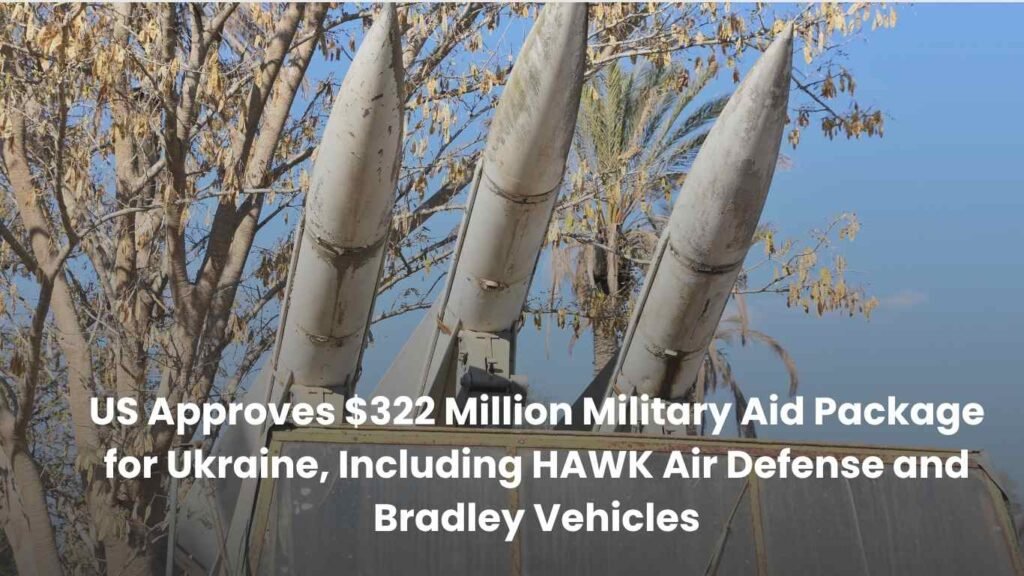Continued Commitment to Ukraine’s Defense
In a move signaling sustained military and diplomatic backing, the United States has authorized a $322 million arms sale to Ukraine. The agreement, which includes advanced air defense systems and radar technology, is the latest effort by Washington to bolster Ukraine’s ability to defend its territory amid its prolonged conflict with Russia.

Announced by the U.S. Department of Defense this week, the sale forms part of the Foreign Military Sales (FMS) program and is designed to support Ukraine’s sovereignty, civilian safety, and critical infrastructure protection.
“This package is aimed at helping Ukraine strengthen its defensive capabilities in the face of persistent threats,” said a senior Pentagon official. “It reflects our continued commitment to a partner nation defending its right to exist.”
What the Arms Package Includes
The approved sale comprises air defense radar systems, command-and-control technology, and related logistical support. These components are critical to intercepting aerial threats and safeguarding populated areas, energy networks, and transportation routes.
U.S. defense officials emphasized that the equipment is not offensive in nature but is tailored to meet Ukraine’s immediate security needs.
The Department of State has formally notified Congress of the sale, a standard step in the FMS process. Lawmakers have a brief period to review the transaction, though few expect significant opposition given bipartisan support for Ukraine in previous defense initiatives.
A Local Perspective: Hope Amid Hardship
On the ground in Ukraine, the announcement has been met with cautious optimism. For many civilians, the presence of reliable air defense systems has become synonymous with daily survival.
In Dnipro, a central Ukrainian city that has faced intermittent aerial threats, residents expressed gratitude for the support—while also acknowledging the deep desire for a peaceful resolution.
“We don’t celebrate weapons, but we’re thankful for protection,” said Iryna, a university administrator and mother of two. “Our children deserve to sleep without fear.”
Humanitarian organizations operating in the region have reiterated the importance of international support not only in defense, but in rebuilding infrastructure, schools, and public services strained by the ongoing crisis.
Global and Political Reactions
The arms deal has prompted a range of international responses. NATO allies broadly welcomed the move, characterizing it as essential to upholding the security framework of Europe and deterring further escalation by Russia.
“This step reinforces the alliance’s collective defense posture,” said a statement from the European External Action Service. “Ukraine’s resilience benefits all democracies in the region.”
In contrast, Russian officials criticized the sale, alleging it undermines diplomatic efforts. Moscow has accused Washington of prolonging the conflict, though the U.S. maintains that supporting Ukraine’s defense is essential to restoring peace through strength.
Domestically, a small number of lawmakers have urged the Biden administration to balance military aid with renewed diplomatic initiatives.
Senator Claire Whitmore (I-OR), a member of the Senate Foreign Relations Committee, remarked:
“Support for Ukraine remains vital, but we must also elevate our diplomatic engagement. A durable peace must be part of the strategy.”
A Broader Human Cost
While defense spending often dominates headlines, experts continue to draw attention to the human toll of the conflict.
According to recent United Nations data, millions of Ukrainians remain displaced from their homes, and infrastructure damage has severely impacted access to healthcare, education, and clean water in several regions.
International aid groups emphasize that alongside military support, investments in humanitarian assistance and post-conflict recovery are essential for Ukraine’s long-term future.
“The needs go beyond defense,” said Dr. Emilia Novak, a regional coordinator for the International Red Cross. “Ukrainians need medicine, housing, mental health support—and a pathway to stability.”
Looking Ahead: Balancing Support and Strategy
The $322 million arms deal marks yet another chapter in the evolving relationship between the U.S. and Ukraine. While it offers tangible support at a critical time, it also raises enduring questions about the long-term pathway toward peace.
As global powers navigate the complexities of defense, diplomacy, and reconstruction, many observers stress the importance of maintaining focus on the human dimension of the conflict.
For now, the air defense systems may offer Ukrainians a greater sense of security—but ultimately, lasting peace will require more than hardware.

